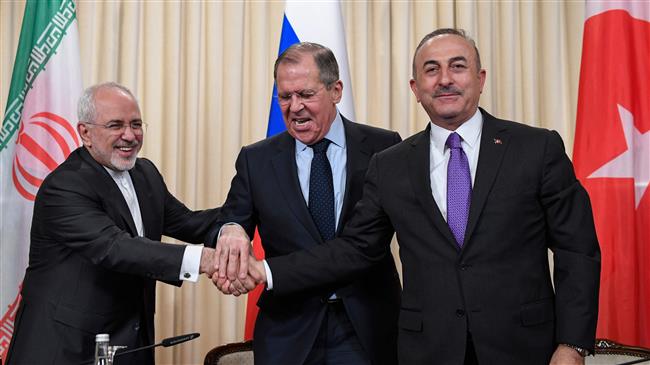
RNA - At the end of their talks in Moscow on Saturday, Iranian Foreign Minister Mohammad Javad Zarif and his Russian and Turkish counterparts Sergei Lavrov and Mevlut Cavusoglu, respectively, whose countries act as guarantors of the Syria ceasefire, issued a joint statement.
According to the statement, they expressed their determination to increase tripartite coordination on the basis of the joint statements issued by Iranian President Hassan Rouhani and his Russian and Turkish counterparts Vladimir Putin and Recep Tayyip Erdogan, respectively, in November 2017 and April 2018.
The ministers "agreed to increase joint efforts aimed at facilitating the achievement of a lasting political settlement in Syria envisaged by the UN Security Council Resolution 2254 and through full use of multi-level mechanisms of the Astana format," the statement read.
The presidents of Iran, Russia and Turkey in April reaffirmed their commitment to work toward achieving a sustainable ceasefire between warring sides in Syria and bringing peace and stability to the war-torn Arab country.
Rouhani, Putin and Erdogan, “reaffirmed their determination to continue their active cooperation on Syria for the achievement of lasting ceasefire between the conflicting parties and advancement of the political process envisaged by UN Security Council Resolution 2254,” said a joint statement issued at the end of the meeting of the three leaders in Ankara.
Iranian Foreign Minister Mohammad Javad Zarif said on Saturday that military approaches would fail to resolve the Syrian crisis, stressing that military intervention of certain countries has only prolonged the sufferings of people in the war-stricken state.
Zarif was speaking at a joint news conference with his Russian and Turkish counterparts in Moscow, where the three top diplomats discussed the latest developments in Syria.
The top Iranian, Russian and Turkish diplomats said the Astana peace process is the "only international initiative that had helped practically improve the situation in Syria through joint efforts to combat terrorism, reduce the level of violence and create favorable conditions for the political settlement including via facilitating broad intra-Syrian dialogue," the statement said.
They agreed to hold the next International Meeting on Syria in Astana in May 2018, it added.
It noted that Zarif, Lavrov and Cavusoglu said the Astana talks must "ensure real progress in achieving a political solution in Syria through an inclusive, free, fair and transparent Syrian-led and Syrian-owned process based on the free will of the Syrian people."
They agreed to hold more regular joint consultations of high-level representatives of the three guarantors with the United Nations Secretary General António Guterres and his special Envoy for Syria Staffan de Mistura, it added.
According to the statement, the three foreign ministers reaffirmed their determination to continue their cooperation in order to ultimately eliminate Daesh terrorist group, Jabhat Fateh al-Sham, formerly known as al-Nusra Front, and all other individuals, groups, undertakings and entities associated with terrorists as designated by the UN Security Council in Syria.
It added that they highlighted the importance of de-escalation efforts and reiterated their commitment to preserve the ceasefire in Syria that had become instrumental in helping to reduce violence on the ground and alleviate the humanitarian suffering in the war-stricken country.
The ministers rejected all attempts "to create new realities on the ground" under the pretext of fighting terrorism and expressed their determination to stand against separatist agendas aimed at undermining Syria's national sovereignty and territorial integrity as well as security of the neighboring countries, the statement said.
The Iranian, Russian and Turkish foreign ministers strongly condemned any use of chemical weapons in Syria and called on the Organization for the Prohibition of Chemical Weapons (OPCW) to "promptly and professionally" investigate into an alleged chemical attack in Syria.
Western states blamed the Syrian government for the suspected chemical weapons attack in the Damascus suburb town of Douma on April 7.
One week after the incident, the US, Britain and France launched a coordinated missile attack against sites and research facilities near Damascus and Homs with the purported goal of paralyzing the Syrian government’s capability to produce chemicals.
According to Press TV, Syria has rejected the accusations of possessing chemicals. It surrendered its chemical stockpile in 2013 to a mission led by the OPCW and the UN.
The joint statement further said the three foreign ministers reaffirmed their commitment to continue joint efforts aimed at protecting the civilians, improving the humanitarian situation via facilitating rapid, safe and unhindered humanitarian access to all those in need and creating conditions for the safe return of refugees and internally displaced persons.
They "called upon the international community, first and foremost the UN and its humanitarian agencies, to increase their assistance to Syria in the interest of all Syrians, including by facilitating humanitarian mine action, restoring basic infrastructure together with social and economic facilities, and preserving historical heritage," it concluded.
847/940